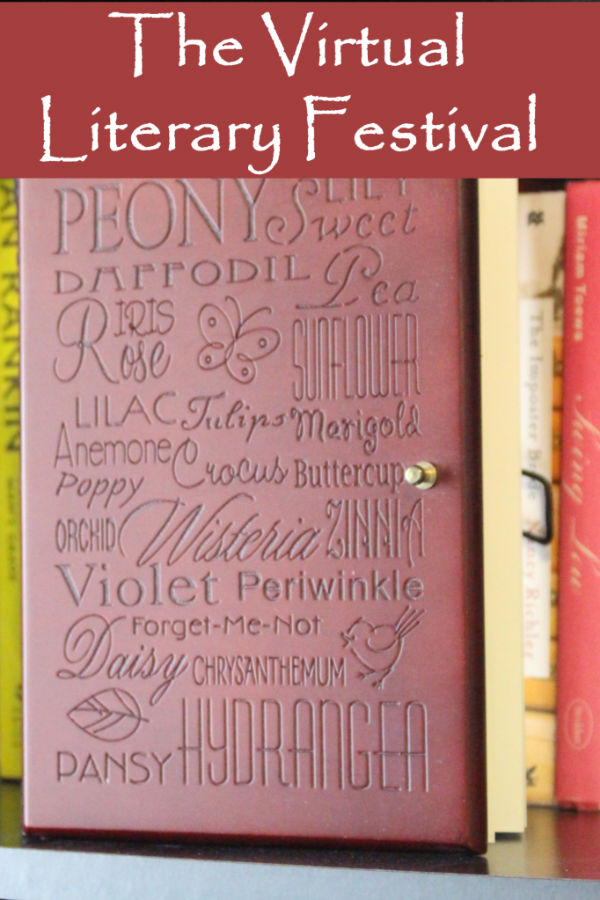Earlier this month I attended the Saskatchewan Festival of Words. Virtually. This is the year of cancelled festivals. A number of festivals have staged special online presentations or performances in lieu of their regular festivals. And some, like the Saskatchewan Festival of Words, moved their entire festivals to online versions.
The Saskatchewan Festival of Words is an annual literary festival held the third weekend in July with events spread over four days in and around Moose Jaw, Saskatchewan, Canada. Events include author readings, interviews, panel discussions, concerts, open mic nights, and writing workshops. Their 2020 online version featured 21 events spread over a seven-day period. Events were free but preregistration at each event was required. I’d not attended the Saskatchewan Festival of Words before and took advantage of the online opportunity. I registered for several events.
The format of literary festivals may fit into online formats better than other types of festivals, but I was still a bit skeptical of the experience. It turned out to be quite good. I was as engaged in some of the sessions as I would have been in person. The sessions were well-run and professional. There was only one that had a short technical issue and that was resolved within a few minutes.
Festival presenters used the Google Meet platform. Their conversations and presentations were live-streamed to registrants via YouTube. Presenters, moderators, and panel members appeared in separate windows on the screen. There was a chat box available at the side for registrants to make comments or ask questions. (Unlike the Zoom meetings we’ve become familiar with over the past few months, I and other registrants were not seen or heard.) In workshop sessions, some presenters shared their screens with the presentations appearing in a window beside them.
A box underneath the presenters’ screens printed the text of what presenters were saying in real-time. The Google Meet captioning facility was used for this. I admit I found this a bit distracting at first. It was both amazing to see how well it could translate from speech and amusing to see what it came up with when it didn’t get it right. Place and people names were areas that could result in interesting translation. Punctuation became weird when those speaking paused in places the translator wasn’t expecting. I hope those blips didn’t destroy the essence for the hearing-impaired.
Based on my experience with the Saskatchewan Festival of Words, I have some thoughts on the advantages and disadvantages of the online festivals. Like many other experiences in this pandemic era, my online literary festival experience showed me we can find other ways of doing things while at the same time reminding me of the joys of the “before time” I took for granted.
Advantages of Online Literary Festivals
- Accessibility. The online option allows for attendance at festivals that might have been out of reach otherwise because of the time or money involved in travel. Being about a six-and-a-half-hour drive from my home, a trip to Moose Jaw to attend in person is certainly feasible, but I would need to spring for hotels and meals. Festivals in further locations would require larger travel expenditures.
- Convenience. Travel time and parking issues do not exist when attending a session virtually from within your own home. You can also attend in your pyjamas if you wish and none of the other registrants will know.
- The chat feature allows you to see feedback from a number of other registrants. At an in-person event you may whisper with the person(s) beside you, but not with those on the other side of the room. More voices may be “heard” through the chat box.
- The chat feature may make it easier to ask questions, especially if you are an introvert.
Disadvantages of Online Literary Festivals
- It is easy to become distracted with dings of incoming emails or other notifications and things happening in your house. Because of this, the online option may require greater concentration.
- There is a convivial atmosphere at an in-person festival that cannot be properly duplicated in the virtual environment.
- You don’t meet other people face-to-face as you do at in-person festivals, where you have the opportunity to talk with them before and after events, learn about them, and share reactions to events in one-to-one or small group discussions.
- After a number of online sessions over a few days, fatigue with it all sets in. One can also start to feel overwhelmed and tired after several days of in-person conference sessions, but I think the fatigue with the online sessions is a bit different and sets in sooner. A little over a month into the pandemic lockdown I began to read stories about something called “Zoom fatigue.” The fatigue was said to be the result of having to concentrate more intently in video sessions in order to absorb information as well as the way we process information over video.
Would I attend another online literary festival? Yes. The events at the Saskatchewan Festival of Words were free, but I would be willing to pay to attend festivals of interest. The savings in travel costs still make this an affordable option.
Am I looking forward to being able to attend a literary festival in person? Most definitely.
What has been your experience with online festivals?


Good to read about your experience Donna. I had looked at some of those Saskatchewan sessions and thought about giving them a try but didn’t follow through. There seem to be so many more opportunities available to writers these days because you don’t have to travel to participate that sometimes it is almost overwhelming. At writing workshops I have attended in person in the past the casual interactions with fellow writers has often been the most valuable part of the experience and I miss that with online formats.
MaryLou, the casual interactions with fellow writers is definitely a plus of the in-person conferences/workshops. We will appreciate them even more, I think, when we get a chance to have them again. In the meantime, I may take in a couple more virtual events.